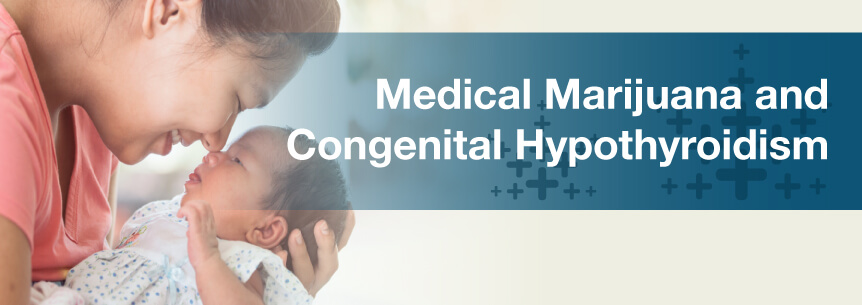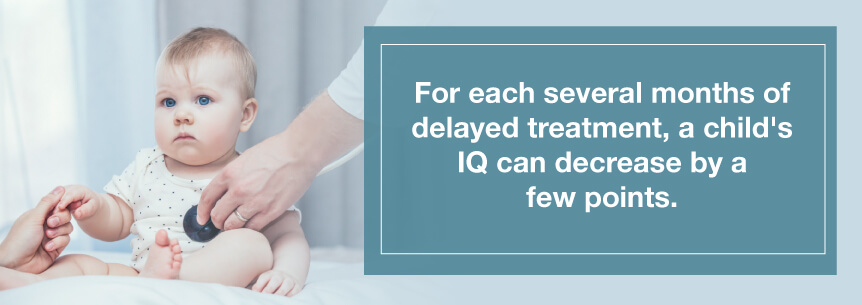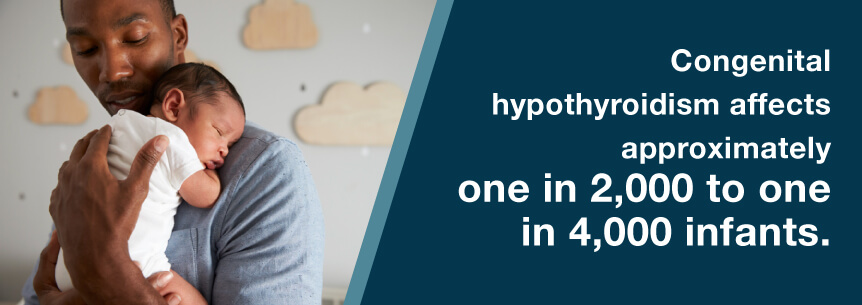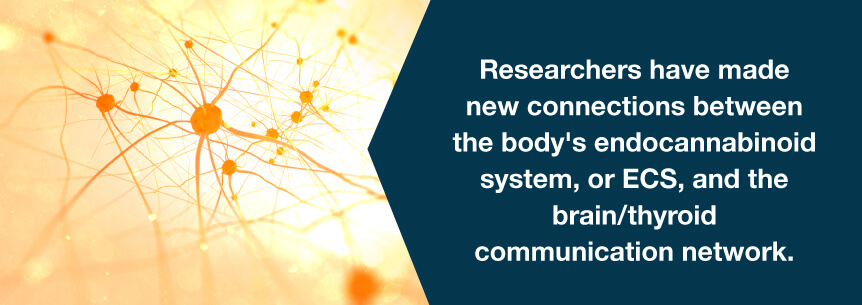
Thyroid disorders can lead to a major group of emotional and physiological disruptions in your brain and body. These disturbances may seriously affect the quality of your everyday life, bringing on symptoms like heavy mood swings, extreme weight loss or gain, depression, anxiety and more. Thankfully, medical marijuana plays a big role in alleviating these and other symptoms of congenital hypothyroidism.
Hypothyroidism is a term describing an underactive thyroid gland. Congenital hypothyroidism is a condition where a newborn baby can’t make normal thyroid hormone amounts. This condition affects approximately one in up to 4,000 children, according to the American Academy of Pediatrics and Pediatric Endocrine Society, and is usually permanent, requiring treatment for the rest of their lives.
Your thyroid gland sits in your lower neck and is shaped like a butterfly. The gland creates iodine-containing hormones to regulate brain development, growth and the rate of your metabolism’s chemical reactions. Those with the condition have low levels of these essential hormones.
Since your infant’s growth and brain development depend on this important thyroid hormone, if left untreated, it can cause growth failure and mental retardation. Fortunately, treatment is available, and if your baby receives early diagnosis and treatment, they can go on to lead a healthy life.
Common causes of congenital hypothyroidism include a thyroid gland that’s:
Infants don’t inherit these abnormalities from their parents.
Other potential causes are:
While this is not as common, a mother taking medication during pregnancy or who has thyroid disease may cause congenital hypothyroidism.
Hypothyroidism in younger kids and infants can be either acquired or congenital.
Acquired hypothyroidism is usually due to Hashimoto, or autoimmune, thyroiditis, and occurs later on in childhood and adolescent life. Around half of children with this condition come from a family with an autoimmune thyroid disease history, reports Merck & Co., Inc.
Though it’s not as common, radiation therapy to your neck and head for specific types of cancer can cause hypothyroidism, as can total body irradiation to prepare for a bone marrow transplant, as well as specific medications such as:
Patients receiving definitive therapy for thyroid cancer or Graves’ disease also receive therapy for permanent hypothyroidism.
Most cases of congenital are sporadic. However, around 10 to 20 percent are inherited. Typical causes involve:
Multiple types of dyshormonogenesis may result from defects in any thyroid hormone biosynthesis steps. Around two-thirds of dysgenesis cases involve ectopy, underdevelopment of the thyroid gland or absence of the thyroid gland.
While rare, hypothyroidism in the U.S. is occasionally the result of a maternal iodine deficiency. The deficiency is a more common cause of hypothyroidism in developing countries. Other rare causes of transient hypothyroidism are:
Central hypothyroidism, while also rare, may result from pituitary development structural anomalies — patients typically also have other deficiencies in the pituitary hormone.
Introduced in 1975, newborn screening for congenital hypothyroidism has resulted in doctors recognizing and treating affected infants before they show any symptoms or signs of hypothyroidism. Widespread screening has significantly reduced the adverse developmental and neurological effects of congenital hypothyroidism.
Since newborn screening became commonplace, the reported incidence of congenital hypothyroidism cases worldwide has more than doubled, with estimates between one in 2,000 and one in 4,000 infants.
At birth, most newborns don’t show any symptoms or signs of thyroid hormone deficiency, making newborn screening imperative. Other infants might show some of these characteristics, either at birth or slowly developing over their first several months of life:
If a physician doesn’t treat them quickly, children born with a seriously underactive thyroid gland may develop an intellectual disability. For each several months of delayed treatment, a child’s IQ can decrease by a few points. Congenital hypothyroidism may also affect bone strength and growth. Other congenital hypothyroidism complications or effects may include:

Some children with the disorder, even with treatment, may have slower learning than other children their age.
A study of the possible risk components for psychiatric disturbances and behavioral disorders involved a group of subjects with early-treated congenital hypothyroidism — consisting of 12 children and 18 adolescents — and a control group of normal subjects consisting of 58 children and 58 adolescents.
The study showed the early-treated CH adolescents and children displayed more behavioral problems than the control group. Also when compared with the control group, they showed significantly higher scores on the scales for:
U.S. National Library of Medicine estimates show:

Since congenital hypothyroidism in infants is difficult to diagnose and doctors diagnose cases based on symptoms and signs only, all U.S. hospitals, under the state health departments’ supervision, screen newborns for the condition by collecting blood from the infant’s heel before they get discharged from the hospital.
Doctors prescribe the pill form of levothyroxine thyroid hormone medication to treat congenital hypothyroidism. Most children will need lifetime treatment. You should crush levothyroxine and give to your child once daily by mixing it with either formula, a little water or breast milk using a syringe or dropper. Don’t use soy protein-based formulas to mix it with, since these tend to interfere with thyroid hormone absorption.
To ensure your infant has normal brain development and growth, give them their thyroid hormone daily and make sure they have regular pediatric endocrinologist checkups. The pediatrician will conduct thyroid function tests periodically to adjust the medication as your child grows properly.
The pill’s hormone is the same as what your body makes naturally, and you’re just replacing what’s missing. Usually, side effects only occur if you give too high of a dose. Side effects of levothyroxine may include:
Monitoring the levels of blood thyroid hormone is an essential part of treatment to ensure the doctor can adjust the medication dose with the rate at which the child is growing. Doctors usually conduct blood tests every one to two months until the baby is six months old, then every two to three months after that.
According to the American Thyroid Association, infants with congenital hypothyroidism should see a pediatric endocrine specialist to manage the condition. They’ll provide instructions on how they’ll monitor blood testing.
Researchers have made new connections between the body’s endocannabinoid system, or ECS, and the brain/thyroid communication network. In fact, your ECS, which is present in both your thyroid gland itself and your central nervous system, may play an essential role in assisting in and expediting proper communication between your thyroid and brain.

What this ultimately implies is your ECS, and its cannabinoid receptor network, may directly influence proper thyroid hormone release essential for overall homeostatic health and healthy organ functioning.
Patients can use CBD, usually a high-quality CBD oil, for treating pretty much all forms of thyroid disorders like:
CBD has been anecdotally reported to successfully and efficiently treat these conditions. However, there have also been many studies showcasing the therapeutic regulatory effects of cannabinoids on the endocrine gland.
For instance, the European Journal of Endocrinology published a 2002 study proposing evidence of functional rat thyroid CBD receptors being able to regulate T3 and T4 hormone release.
The study used a molecular detection method to show the intracellular cannabinoid receptors’ presence, and researchers observed a 30 percent hormone release reduction within four hours of active cannabinoid administration as a direct result of the rat thyroid containing cannabinoids.
A 2009 issue of Endocrinology, a major medical journal, showcased CBD’s potential ability to activate thyrotropin-releasing, hormone-synthesizing axons between the central nervous system and thyroid gland.
Many symptoms can arise from not having enough thyroid hormone. The first problematic sign in children is a slower growth rate. They may also experience:
Medical marijuana for congenital hypothyroidism can treat other side effects as well, but the ones above are the most common.
CBD is known for being able to treat thyroiditis’ underlying cause — inflammation of the thyroid gland itself. Cannabinoids have anti-inflammatory properties and can reduce inflammation in many specialized tissue types and organs. Studies document this.
When deciding on medical cannabis for congenital hypothyroidism strains, it’s best to know a little about Sativas, Indicas and hybrids.
Now, let’s take a look at some good cannabis and congenital hypothyroidism symptom strains.
Strains for Depression
Strains for Anxiety and Irritability
Strains for Fatigue
Strains for Inflammation
You’ll find various delivery methods of gaining the health benefits of medical cannabis. For many years, ingesting the herb through eating it in food was the tried-and-true method of getting all the essential compounds, such as THC, CBD and CBN, into your body. Not only is this the safest way of using medical weed, but it’s also more effective in gaining the health benefits.
While smoking the herb has been around for a long time as well, you do risk completely burning up some of the essential compounds in the weed when it heats to the point of combustion. Not to mention, smoking also releases other unwanted chemicals.

A high-quality CBD oil is probably the most effective and potent form of CBD administration. Since the oils are natural molecular carriers, they carry more CBD molecules by “volume” than other types of CBD-containing products.
You can also ingest CBD oils more easily, and your body absorbs them efficiently by placing a couple of droplets under your tongue.
Now that you know marijuana and congenital hypothyroidism treatment is effective at treating unwanted symptoms of the condition, you may be wondering what’s next. How can you get your hands on this miracle medical herb? The answer is by visiting our Marijuana Doctors website and booking your online consultation appointment with a qualified marijuana doctor.
Your physician will review your symptoms, and if you qualify, they’ll provide you with your required recommendation letter so you can begin searching for your cannabis for congenital hypothyroidism products in our extensive database of marijuana dispensaries.
Find A Doctor Find A Dispensary